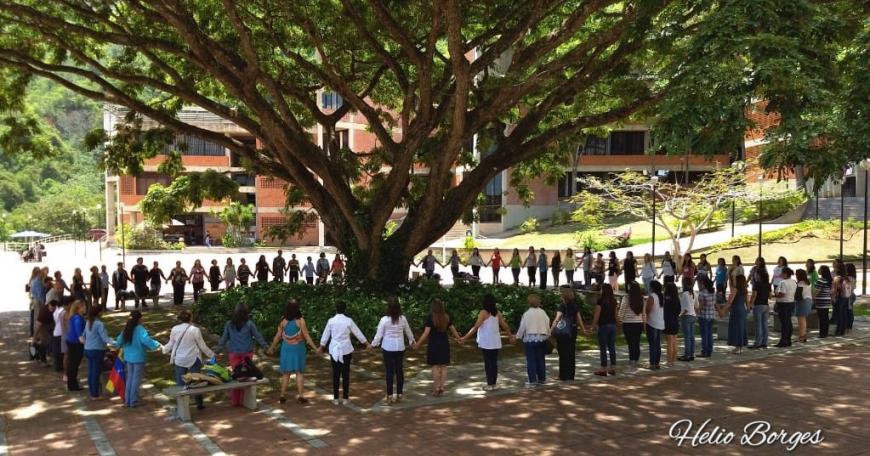
u.lab MOOCs on MITx: Helping Learners and Communities Create Change Around the World
We live in a time of disruptive change. Individuals, communities and institutions are increasingly faced with challenges across all social systems and societies. Being able to activate our capacity to lean into the emerging future may well be the most important leadership challenge of our time. How does one cultivate curiosity, compassion and courage in the face of prejudice, anger and fear?
u.lab is a series of highly experiential edX courses in which participants identify an issue or challenge that matters to them and go through a 4-month innovation process that helps them turn ideas into action and real world change. The next u.lab course begins on September 13th. Interested learners can enroll in a self-paced introductory course to learn more.
Caracas, Venezuela: Bridging Politics and Family Strife
Vicente Paez is a young man who lives in one of the poorest districts of Caracas. His personal political views led to him being estranged from his own family. His parents are local community leaders for the government party, while Vicente is a councilman for the Primero Justicia opposition party that was outlawed by the dictatorship. Seven years ago, Vicente was expelled from his paternal home and for a while was homeless.
He was allowed to sleep on the party’s premises, and later moved in with some friends. After his party won the local elections, the Mayor put him in charge of community relations and eventually Vicente was elected as a council member of the Sucre district. That’s when Vicente got involved in the local Caracas u.lab hub. U.lab hubs are self-organised place-based groups that meet in-person to watch monthly live classroom sessions and practice the methods and tools introduced in the course. The Caracas Hub had been adapting and customising a program for Spanish-speaking people called “Proyecto Hikola”, and inviting educational community members, social activists, and NGOs in the Great Caracas area to participate.
When he began the program, Vicente was looking for a clean cut from his past. His intention was focused on his political future, and he believed that u.lab was going to help him polish his political skills. He joined a case clinic group of five u.lab participants who met either in-person or virtually each week for a 75-minute dialogue around a personal or professional leadership challenge that deeply matters to them. With every coaching circle his intention slowly shifted back to reconciling with his family.
By applying the u.lab leadership tools to his personal situation, Vicente was able to reach out to his family and engage them in dialogue. Today, thanks to his u.lab experience, Vicente is more aware of the importance of human relationships, looking to develop spaces for deep listening and generative conversations in his personal life and political career.
Helio Borges, facilitator of the Caracas u.lab Hub, who witnessed Vicente’s transformation, says: “His case is a metaphor of what is needed to reconstruct a society. We don't need the left to win over the right or vice versa in order to impose our world view on others. Instead, all of us need to be working on the issues that affect us as human beings. u.lab gives us a process and tools to do just that.”
Helio reflects further on the multi-faceted impact created by u.lab: “Vicente’s life, the lives of our other 119 new u.labbers, and the lives that their prototypes are touching positively, are neither part of a fairy tale, nor a paragraph of a dialectic academic discussion. This is as real as life can get. Moreover, when you are a facilitator of these processes, your life gets touched, too.”
Arras, France: From Classroom to 12-month Global Journey
Opaline, affectionately known by her students as “miss Earthworm”, is a young French high-school agronomy teacher and journalist, passionate about education, soil and farming. She was inspired through u.lab’s action research-based approach that emphasizes learning by doing and u.lab’s focus on listening as a tool in both leadership and professional development.
Opaline realised that there was a great deal to be learnt through the diversity of experiences of farmers across the world, but that her students were not connected to these opportunities. Blending her passion for teaching, agronomy and travel, she decided to take a year off from teaching to travel the globe. Opaline stayed at farms for 1 to 3 weeks at a time, applying the listening tenets she had learnt with u.lab to observe how each farm implemented agroecology in their given social, economic, natural and historical contexts.
Opaline named her project Les Agron’Hommes (a clever pun in French that signifies both “agronomists” and “The Agronomy Folks”) and has been documenting her globetrotting learnings via her YouTube channel. The video below, titled “10 months in 8 minutes,” documents her journey of discovery:
u.lab has created an international network of digitally-connected hubs through the Community page on the Presencing Institute website. Through this global u.lab network, Opaline was able to find other change-makers innovating around the themes of Education, Health, Well-being and Food. On the last lap of her 12-month trip, Opaline connected to the Campinas u.lab in Brazil and shared her experiences around supporting and co-creating social innovation and local initiatives.
If these stories inspire you, sign up now for u.lab 0x, a short, self-paced introduction to u.lab concepts that will prepare you for the follow-on (4-month) u.lab1x course, scheduled to begin on 13th September 2018.
Read more stories from learners and communities who have been impacted by the u.lab here.

